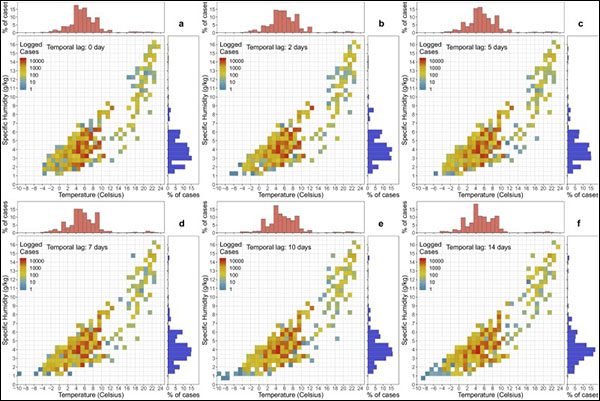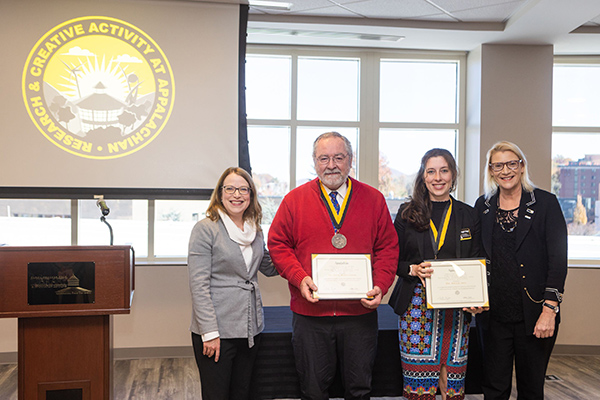BOONE, N.C. — Dr. Maggie Sugg, associate professor and honors director in the Appalachian State University Department of Geography and Planning, has been awarded two grants totaling more than $1.5 million to continue her research on how climate disasters impact youth mental health. Findings from Sugg’s research could be used to improve existing and future intervention efforts.
“Dr. Sugg’s work toward understanding the complex relationship between climate disasters and youth mental health is outstanding,” said Dr. Mike Madritch, dean of the College of Arts and Sciences. “Her research advances our knowledge in this critical area that will have impactful interventions to improve the well-being of future generations.”
Over the next three years, Sugg will receive $1 million from the National Academies of Sciences, Engineering and Medicine's Gulf Research Program to lead a project titled “Assessing Mental Health Disparities in At-Risk Youth After Climate Disasters in Louisiana, USA.” This study will identify the mental health impacts of climate disasters on youth in Louisiana’s Gulf Coast, focusing on marginalized communities facing heightened risks due to social inequities and recurring environmental hazards.
In collaboration with researchers from North Carolina State University, the American Foundation for Suicide Prevention and VIA LINK (an organization that provides crisis support and suicide intervention support services to the people of Louisiana), Sugg plans to utilize digital crisis platforms to assess if youth mental health is affected by key events such as hurricanes, heatwaves and the COVID-19 pandemic. The funding will also support the hiring of a full-time Climate Health Fellow.
By examining the causal links between climate change and mental health disparities, the findings will offer crucial insights for developing scalable digital interventions to protect youth mental health in the face of future climate challenges.
Additionally, the National Science Foundation will award Sugg over $525,000 to lead a project titled “Mental Health Implications of Compounding Climate Events on Youth Populations.” The three-year study will investigate the mental health impacts of compounding climate events (CCEs) — such as hurricanes and heatwaves — on youth populations across the United States, addressing a critical knowledge gap as these events are expected to become more frequent and intense.
This study, led by an interdisciplinary team of geographers, epidemiologists, psychologists, environmental economists and climate scientists, will analyze the direct and indirect mental health effects of CCEs throughout the United States. By integrating large climate datasets with novel mental health data from partners such as Crisis Text Line and the North Carolina Institute for Climate Studies (NCICS), the research will identify CCE hotspots and develop a spatial model to assess impacts on different sub-populations. The findings will provide critical insights into the youth mental health crisis linked to CCEs, paving the way for improved response strategies.
“Youth mental health is often overlooked in the context of climate disasters, yet young people are at a critical life stage and among the most vulnerable,” explained Sugg. “Our research seeks to fill this critical gap and provide the insights needed to support them during these challenging events.”
For this project, Sugg will collaborate with Dr. Jennifer Runkle and Dr. Douglas Rao from NCICS and Dr. Dennis Guignet, associate professor in App State’s Department of Economics. Additionally, Caleb Blackburn ’21 and Bella Vanden Boom ’23 — both alumni of the undergraduate geography program who are currently pursuing master's degrees in geography — and Quinn Keefer, an undergraduate geographic information systems major from Asheville, will assist with analysis.
“I am immensely proud of Dr. Maggie Sugg’s remarkable achievements and her national reputation as a leading health geographer and researcher,” said Dr. Saskia van de Gevel, chair of the Department of Geography and Planning. “Her innovative approach, which leverages digital crisis platforms and interdisciplinary collaboration, is not only advancing our knowledge in health geography, but also paving the way for scalable interventions that can protect the mental health of people during future climate challenges. Dr. Sugg’s research demonstrates the power of geography in addressing some of the most pressing public health issues of our time.”
About Dr. Maggie Sugg
Sugg earned her bachelor's degree in biology and her master's and doctoral degrees in geography from the University of North Carolina at Chapel Hill. During this time, she conducted research at the Carolinas Integrated Sciences and Assessments at the University of South Carolina and the Southeast Regional Climate Center at UNC-Chapel Hill and received a Science to Achieve Results Graduate Fellowship in Public Health from the Environmental Protection Agency.
Sugg joined the App State Department of Geography and Planning as an assistant professor in 2015 and was promoted to associate professor in 2021. Her research interests include climate and health, human vulnerability to environmental hazards, public health and spatial statistics. The recipient of the 2019 College of Arts and Sciences William C. Strickland Outstanding Junior Faculty Award, National Science Foundation’s CAREER Award, and 2022 Provost's Award for Excellence in Research, Scholarship and Creative Activity, Sugg has published over 80 peer-reviewed articles in high-impact scientific journals such as Science of the Total Environment and Journal of Adolescent Health. In 2023, Sugg was awarded the Association of American Geographers Health and Medical Geography Specialty Group's 2023 Emerging Scholar Award in Health and Medical Geography.
Sugg integrates her research interests in climate and health into her courses, which include Global Health and Disease, Climate and Society and Advanced Quantitative Methods.
What do you think?
Share your feedback on this story.
About the Department of Geography and Planning
The Department of Geography and Planning promotes the understanding of the spatial dimensions of human behavior within the physical and cultural systems of the earth, and the role of planning in achieving improvement in those systems. The department offers degrees in geography and in community and regional planning. Learn more at https://geo.appstate.edu.
About the College of Arts and Sciences
The College of Arts and Sciences (CAS) at Appalachian State University is home to 17 academic departments, two centers and one residential college. These units span the humanities and the social, mathematical and natural sciences. CAS aims to develop a distinctive identity built upon our university's strengths, traditions and locations. The college’s values lie not only in service to the university and local community, but through inspiring, training, educating and sustaining the development of its students as global citizens. More than 6,800 student majors are enrolled in the college. As the college is also largely responsible for implementing App State’s general education curriculum, it is heavily involved in the education of all students at the university, including those pursuing majors in other colleges. Learn more at https://cas.appstate.edu.
About the Research Institute for Environment, Energy and Economics
Since 2008, Appalachian State University’s Research Institute for Environment, Energy and Economics (RIEEE) has fostered interdisciplinary research on the environment, energy and economics, especially the areas in which these subjects intersect. The institute serves as an umbrella organization for three research centers: the Appalachian Energy Center, Center for Economic Research and Policy Analysis, and Southern Appalachian Environmental Research and Education Center. Additionally, the institute manages and supports App State’s student-led solar vehicle team, Team Sunergy — an exemplary model of the integrative and experiential student learning, leadership and innovation opportunities the institute seeks to foster at App State. Learn more at https://rieee.appstate.edu.
About Appalachian State University
As a premier public institution, Appalachian State University prepares students to lead purposeful lives. App State is one of 17 campuses in the University of North Carolina System, with a national reputation for innovative teaching and opening access to a high-quality, cost-effective education. The university enrolls more than 21,000 students, has a low student-to-faculty ratio and offers more than 150 undergraduate and 80 graduate majors at its Boone and Hickory campuses and through App State Online. Learn more at https://www.appstate.edu.








![How NCInnovation Is Rethinking Economic Development in North Carolina [faculty featured]](/_images/_posts/2026/02/rethinking-economic-development-600x400.jpg)








